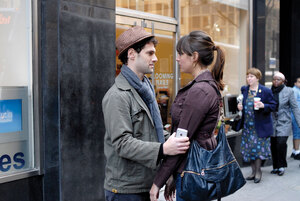Film portrays love in a New York minute
One of the highest aspirations of a filmmaker is to hear that his or her film is “refreshing.”
There is something about the novelty of exploring old archetypes, familiar places and tired stories from previously unprivileged perspectives that leaves us intoxicated by what we are seeing. We can almost feel the synapses from disparate regions of consciousness springing into being, bridging the gaps in our understanding of the world and forcing onto the momentary realization that there is something in the world to be probed beyond the scope of our own experience.

Stop and stare · Paris, Je T’aime producer Emmanuel Benbihy followed up his 2007 compilation of romantic vignettes with New York, I Love You, a series of short segments about those searching for love in New York City. Natalie Portman, Shia LaBeouf and Orlando Bloom are among the film’s cast. - Photo courtest of 42 West
Emmanuel Benbihy, producer of New York, I Love You, knows this. Rather than enlist the aid of the Hollywood heavyweights to fabricate some no-doubt-wonderful-but-all-too-predictable vignettes for the second in his series of films about the spectrum of love in the “mythic cities” of the world, he stayed true to his Paris, Je T’aime mentality, synthesizing the narratives of relative newcomers to the cinematic conversation. Along with fellow producer Marina Grasic (of Crash fame), Benhiby hired 11 young directors — including actress Natalie Portman — to canvas the neighborhoods of the Big Apple and paint the portraits of love in its varied states.
At the film’s outset, the information we receive as viewers is the same worn-out set of clichés we have always heard applied to New York City: New York is overcast, New York is full of pigeons, New York has many cabs, and it is difficult to get one of these cabs to stop for you.
But by the time two of the film’s central characters (if any characters can be called central in a piece that intertwines 11 stories in a way that emphasizes their equal importance) incidentally hop into the same taxi and deliberate over the best route to take to their destination so animatedly that the driver shoos them from the Plexiglas-encased backseat with jaggedly inflected shouts, we are already waving goodbye to the territory of anecdotal moviemaking.
The subsequent short films pair box office staples in addition to Portman, like Hayden Christensen, Rachel Bilson, Orlando Bloom, Christina Ricci, Shia LaBeouf and Chris Cooper with the unestablished filmmakers.
With audiences being led through the lives of an orthodox Jew on the day of her wedding and an older, Middle Eastern diamond salesman who simultaneously fantasize about marrying one another, a high school guy’s unique “first time” involving a tree on prom night in Central Park, a cardiovascularly unsound artist whose prime model eludes him in her Chinatown shop, and an elderly couple on the day of their anniversary — there is definitely something that will strike a chord.
Though the stories are truly powered by raw emotions, that is not to say that they’re not up for interpretation; while one audience member laughs outright at a middle-aged stranger’s unabashedly graphic description of what he would do to ensure that a woman achieve a full-blown orgasm, another will slouch down and cringe in discomfort.
In a later narrative, the same couple is seen through the window of a passing cab, and viewers won’t be able to keep from smirking with the knowledge that their ordinary-appearing interaction is actually an elaborate sexual advance.
Such brief glimpses into the lives of other characters whose love stories come to fruition in other parts of the film are the exact reason that Benhiby wanted Grasic on board. He, like so many others in the cinematic community, was riveted by the interwoven narratives of Crash, which communicated to audience members a coherent thesis about race and identity in Los Angeles. Benhiby’s tapestry of stories creates a similarly rich viewing experience, but it also fails in similar ways.
Unlike the organic tone set by his first opus for the many ways we love in a mystic city, New York, I Love You feels forced. Instances of transcendent amusement, sadness and revulsion are somewhat occluded by the ever-present hand of the production team as it pounds us over the head chanting, “We are all connected! We all love, and we all live in the same world!”
And yet, for all that they emphasize the singleness of experience and of setting in the stories, New York, I Love You also loses something very central to the idea of Paris, Je T’aime and Benhiby’s series in general: the notion of the city itself as a character. For as often as we see the New York skyline, hear the distinct accents of the five boroughs and sample an ethnically diverse cast, these stories still feel like they could have taken place in any city and it would hardly have made a difference. A pity for a city that has been reduced to stereotypes for so long and could stand to feel “refreshed.”
